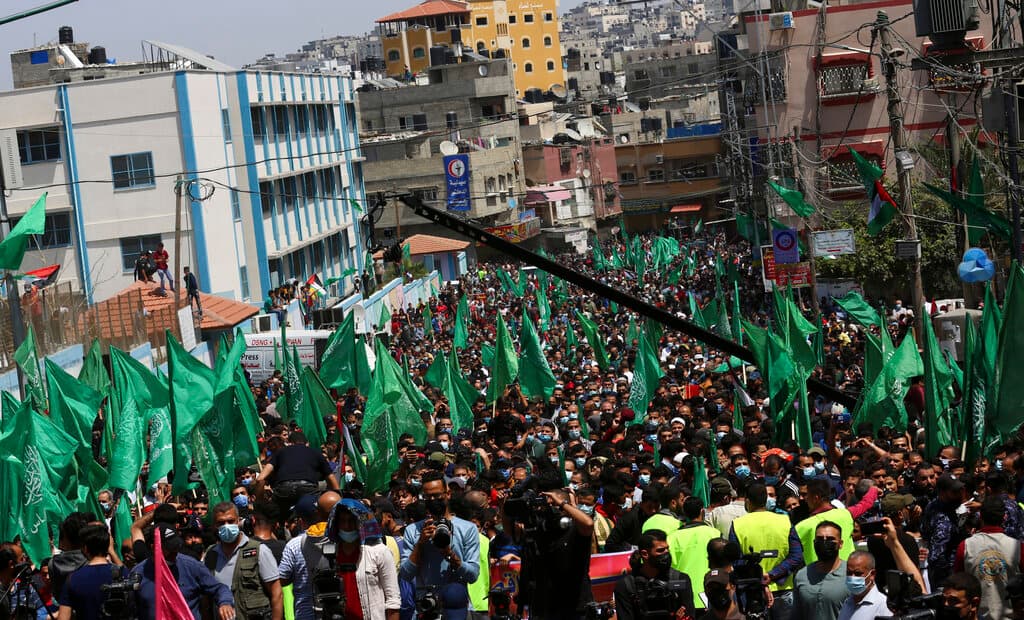An Alarming New Poll Is a Warning to Biden’s Post-War Vision and Shows Palestinians Celebrate October 7
Hamas is surging in the polls as Fatah and the Palestinian Authority’s aging president fade in the wake of war.

As President Biden’s national security adviser, Jacob Sullivan, lands in Israel on Thursday to advance a post-war peaceful vision that would replace Hamas’s leadership in Gaza with the West Bank-based Palestinian Authority, a reputable Ramallah-based pollster is issuing alarming data, recording a dramatic rise of support for war among Palestinians.
The Palestinian Center for Policy and Survey Research, considered the most reliable pollster in the West Bank and Gaza, finds that 72 percent of all Palestinians believe that Hamas was “correct” to launch its October 7 attack in southern Israel. The numbers are higher in the West Bank, where 82 percent back the Hamas onslaught, than in Gaza, where 57 percent do.
Between November 22 and December 2, the Center polled 1,231 adults, of whom 750 people were interviewed face to face in the West Bank and 481 in the Gaza Strip, in 121 randomly selected locations. The questions varied, from agreement with the Hamas October 7 attack and the Israeli response, to humanitarian conditions in Gaza, war crimes and atrocities, and, crucially, who should rule Gaza in the war’s aftermath.
One clear finding: Almost universal dissatisfaction with the aging Palestinian Authority’s president, Mahmoud Abbas. 90 percent of Palestinians agreed that he should resign. The Gaza war “increases Hamas’ popularity and greatly weakens the standing of the PA and its leadership,” the Center’s director, Khalil Shikaki, writes on X.
Among Gaza and West Bank residents, 43 percent now support Hamas, compared with 22 percent who did so before war. Only 17 percent support the Palestinian Authority’s main party, Fatah, compared with 26 percent in September. Most Palestinians support neither of these parties, or had no response.
Even as Mr. Biden remains adamant that Israel has the right to defend itself and assure, by military means, that Hamas would never again threaten its citizens, a gap between him and the Israeli government is growing over the “day after” the war. The president insists that a “revitalized Palestinian Authority” should govern Gaza in the aftermath of the war.
“After the great sacrifice of our civilians and our soldiers, I will not allow the entry into Gaza of those who educate for terrorism, support terrorism, and finance terrorism; no Hamastan, no Fatahstan,” Prime Minister Netanyahu countered Tuesday that “I will not allow Israel to repeat the mistake of Oslo.”
Many Israelis say that for years Mr. Netanyahu weakened the Palestinian Authority by bolstering its rival, Hamas. These divide-and-conquer tactics, his critics say, led to the October 7 attack.
Regardless, the Authority has lost control of much of the West Bank, and it has had no presence in Gaza since Hamas took it over in 2007. Fatah’s corrupt rule, sclerotic leadership, lack of a clear process to succeed the 88-year-old Mr. Abbas, and internal bickering hardly qualify the Palestinian Authority to lead after the war.
Mr. Biden’s vision of a renewed Authority that would unite the West Bank and Gaza and lead a transition to a “two state solution” may require a major revision after the White House reads Mr. Shikaki’s poll. A plurality of Gazans — 38 percent — said Hamas should lead the strip after the war, as did an even more sizable majority — 60 percent — of West Bankers.

